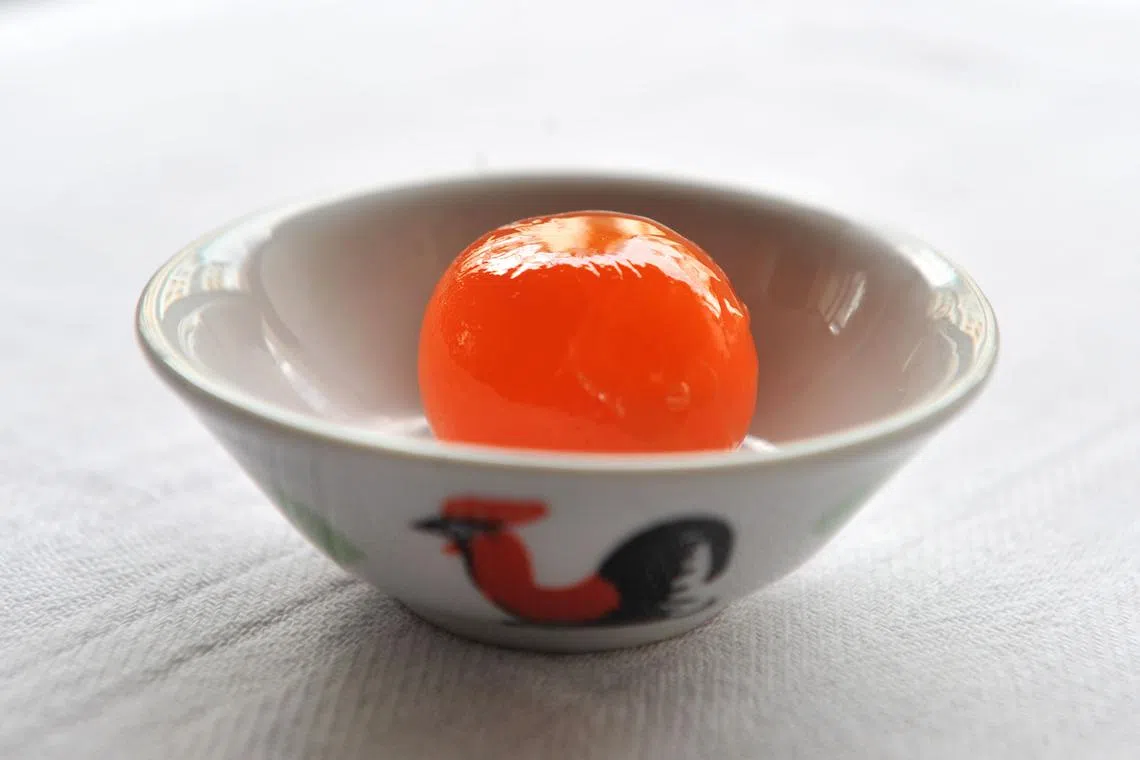Not ‘disgusting food’ anymore: China’s century, salted duck eggs finding fans in US
Sign up now: Get ST's newsletters delivered to your inbox

China’s food-and-beverage sector stands on the precipice of rapid overseas growth.
PHOTO: ST FILE
Follow topic:
BEIJING – In September, a pair of unlikely Chinese culinary icons – century eggs and salted duck eggs – made their debut on the shelves of more than 150 Costco stores in the United States, including Hawaii, with the tasty edibles becoming a big hit ahead of the upcoming Mid-Autumn Festival season.
“Previously, Costco only let us in for Chinese New Year – now we’re an everyday item,” said Mr Wu Hongliang, general marketing manager of Xuri Eggs, the company behind the product. “That’s a huge leap for us.”
For Xuri Eggs, which is based in Kaiping, Jiangmen, Guangdong province, this marks a rare breakthrough. While Chinese preserved and salted eggs accounted for 64 per cent of global processed-egg exports in 2023, most brands had long been widely available only in Asian supermarkets overseas.
Now, these once niche products are finding their way into big box mainstream US grocery stores and supermarkets.
Xuri Eggs has 30 years of experience exporting preserved and salted duck eggs to places like Europe and Japan. It has had a presence in US-based Asian supermarkets for more than 20 years.
But Costco was a different challenge – one the brand spent five years preparing for.
Certification battle
“Competing in Asian supermarkets (overseas) is brutal – each category has six to eight brands, and prices can’t get any lower,” Mr Wu said, adding that the motivation is to break into new channels for better margins.
But early on, “importer distributors told us selling to Costco as an Asian food product was mission impossible”.
The biggest roadblock? Strict US food safety standards.
“The requirements for eggs are extremely strict, especially around certifications,” Mr Wu noted. The brand spent a year securing NSF (National Sanitation Foundation) certification – a US standard for zero antibiotics – for its farms and processing facilities, which meant full renovations of its factories and poultry farms.
“It took courage to tear things down and rebuild,” he admitted. “The test wasn’t just about facilities – it was also about our team’s responsiveness.”
Next came SQF (Safety Quality Food) certification, a top-tier global standard. Xuri Eggs became the first Chinese duck egg farm to earn it, a feat achieved in two years with help from Japanese and Danish poultry experts. The firm also tapped its experience partnering with international Western food chains in China.
“When Costco saw we had both NSF and SQF – two of the highest US certifications – the rest got easy,” Mr Wu said.
“They assigned an auditor to our farms and factories for months, checking randomly. They also audit twice a year. Our whole team got behind this, and no one gave up.”
Creativity and curiosity
Today, the eggs are not just selling, they are also sparking creativity. Mr Wu spoke of US food influencers on YouTube and TikTok.
“Their videos shock us. They eat century eggs with caviar, yogurt, black garlic and even marshmallows. I never thought our eggs could be mixed that way. I have so much admiration for their adaptability and imagination.”
This creativity, he added, has inspired him too. “I grew up eating preserved eggs the traditional way – it limited my imagination. Now, we hope these eggs become regulars on US dining tables,” he said.
Part of the appeal, he believes, is the century egg’s viral “curiosity factor”.
“It used to be called ‘disgusting food’, which made people curious,” he added. “Some even used it to prank others – those videos got millions of views online.”
But apart from the hype, there is heritage.
Xuri Eggs preserves the eggs with rice straw ash and tea leaves for more than 120 days, a method from 300-year-old Qing dynasty book Xingyuan Journal. It is a culinary monograph authored by Li Huanan, a scholar in the reign of Emperor Qianlong during the Qing dynasty (1644-1911).
This method releases amino acids to minimise the protein’s odour, and gives it a beautiful amber transparency that people love, said Mr Wu.
Next stop: US catering
With Costco’s success under its belt, Xuri Eggs is setting its sights on the US catering sector. Mr Wu said the brand already has experience in China partnering with Western caterers to create crossover dishes.
“We’ve put preserved eggs and salted egg yolks in pizzas, burgers, tacos, sushi, bagels, even ice cream. These are co-created with clients to avoid homogenisation.”
China’s food-and-beverage sector stands on the precipice of rapid overseas growth. Over the past two years, the exodus has shifted from scattered experiments to a concerted surge.
Household names like Walovi, Eastroc Beverage and spicy snack maker Weilong have landed on multiple continents.
Some companies are still taking their first steps abroad while established brands are now making their presence known at the likes of Walmart, Costco and other mainstream chains.
For Mr Wu, the journey is bigger than just sales.
“Getting into Costco helps us break into the US mainstream and become visible. It’s an encouragement for many Chinese food and drink brands.” CHINA DAILY/ASIA NEWS NETWORK

